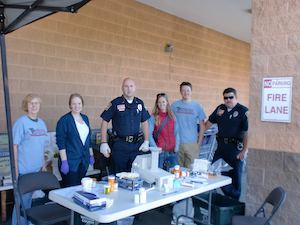Here in Watauga County we are lucky to have relatively clean rivers and a public that is well connected with the health of the local environment. In order to support continued generations of residents who act as good stewards for the High Country and beyond, we must educate students about threats to our local environment and ensure that they feel pride and ownership of the world around them.
The Upper Watauga Riverkeeper has helped with school water-based programs at Hardin Park Middle School and Watauga High School this fall. At Hardin Park, science teacher Alan Felker invited me to speak with each of his 7th grade science classes about the many roles of a Riverkeeper. Our discussion ranged from local river cleanups to litigation against major polluters in Kentucky. I was impressed with the quality of both questions and answers I heard from many of the students. I met up with the students later in the week to assist with Mr. Felker’s aquatics lab on the New River. Students were game to get in the chilly fall water in order to measure water velocity and turbidity, and look for macroinvertebrates used as indicators of biological condition. I hope to see many of these same students for a Watauga cleanup in the spring.
On October 19th, I helped with one of several presentations focusing on marine mammals, climate change, pollution and our connection to those issues here in Watauga County. The North Carolina Museum of Natural Science and the North Carolina Fort Fisher Aquarium, through a grant from NOAA, brought in a geodome presentation that highlighted different marine mammals and threats to them resulting from global warming and plastic pollutants. Lisa Doty, the Watauga County Recycling Coordinator, and I presented a local perspective on recycling and reducing consumption in Watauga County, and the ways our efforts can impact the ocean environment.
I was pleased to find that at least one student in each group knew that plastics are made from fossil fuels, which are non-renewable resources. The students were surprised to learn that Watauga County does not have an operational landfill, so our garbage must be shipped to Lenoir. This means that not only is our waste management more costly, but it also uses more fossil fuel: an average of 8 tractor trailer loads of garbage are sent to Lenoir every day, which costs roughly $1.3 million per year. In contrast, as recycling technology has improved, the demand for recycled plastic has increased: other companies pay Watauga County for recycled plastics and recycling creates 14,000 jobs North Carolina.
We tried to impress upon students some simple every-day things they could do to help curb the influx of waste into our waterways and oceans. Two of the easiest changes that create a large and lasting impact are reducing your use of plastic water bottles and plastic grocery bags. According to the Earth Policy Institute, 1,500 plastic water bottles end up as garbage every second. Additionally, plastic grocery bags are more costly to produce from recycled material than from virgin oil. So when your Watauga High School students turn down that store-bought water in favor of a reusable container or tell you there will be no trip to the store without reusable bags, commend them for doing their part to create a healthier planet!













